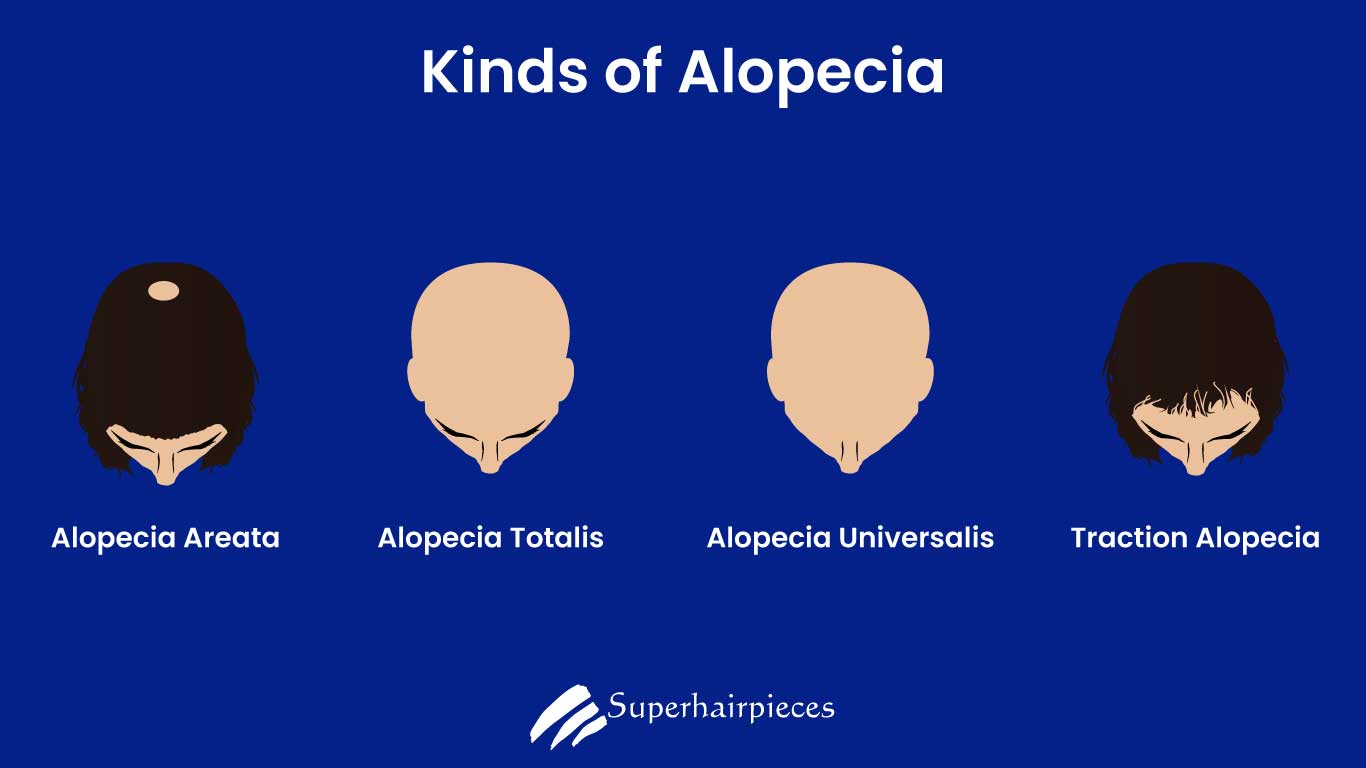Women with Alopecia: Embracing Strength and Beauty
Posted by Santana Fell on Sep 11, 2024
In a society that celebrates long, luscious hair as a symbol of femininity and beauty, it is intimidating to lose it.
Hair loss can be a monumental concern for women who identify themselves through it. Seeing your hair fall out in chunks is not easy.
Losing hair can bring on a whirlwind of emotions like self-consciousness, a downward spiral of self-esteem, stress, anxiety, embarrassment, isolation, shock and devastation.
Grappling with the new reality can be overwhelming. It is plagued by a plethora of questions, a never ending search for solutions, diminishing confidence and self-image, and a feeling of being completely lost.
Our heart goes out to all those suffering from hair loss. We understand you and are taking this opportunity during Alopecia Awareness Month to create awareness and support around Alopecia and hair loss.
Understanding Alopecia
Women can experience hair loss due to several factors like age, medical treatments, stress, ailments, and fatal diseases like Cancer and chemotherapy.
Alopecia is among the significant hair loss factors that affect women worldwide. Let's take a deep dive into alopecia, its impact, and how society is slowly but surely changing its approach to this condition.
What is Alopecia?
Alopecia is an autoimmune disorder that results in varying degrees of hair loss. For some, it could be small patches on the scalp, while for others, it could mean complete hair loss all over the body, including eyebrows and eyelashes.
Often misunderstood and stigmatized, it is more than just hair loss. It's a condition that can affect anyone, regardless of age, gender, or ethnicity.
Understanding alopecia is the first step towards empathy and support for those affected.
Kinds of Alopecia

Alopecia manifests in several forms:
- Alopecia Areata: Hair loss in patches.
- Alopecia Totalis: Complete loss of hair on the scalp.
- Alopecia Universalis: Loss of all body hair.
- Traction Alopecia: Hair loss is caused by pulling or tension of hair strands for a long time.
Each type of alopecia brings its own challenges and emotional toll on those affected.
Alopecia Statistics
According to research done by Pfizer, an estimated 6.7 million people in the United States and 160 million people worldwide have alopecia areata alone.
The numbers paint a vivid picture of how widespread alopecia is. Millions worldwide are living with this condition, yet the lack of awareness and understanding remains a challenge.
Expert Advice on Alopecia
“Pay attention to your hair. Alopecia can be treated and, depending on the type, even halted if caught soon enough. If you see your hair thinning, speak to your doctor first. Sometimes, even the lack of certain vitamins can be the culprit. Never assume it will just get better with shampoo or treatment, as hair health usually starts from the inside out, " says Tara Gerhart, Superhairpieces hair replacement expert.
Is Alopecia Permanent?
The permanence of alopecia varies. Some individuals may experience hair regrowth, while the condition might be more lasting for others. Treatments and therapies exist, but their effectiveness can differ from person to person.
How Wigs Help with Alopecia
Human hair wigs have become a powerful tool in providing confidence and comfort to those experiencing hair loss. They're not just about aesthetics; they're about reclaiming a sense of self and normalcy amidst the struggles of alopecia.
Client Testimonials
Hearing firsthand from those living with alopecia is enlightening. Stories of resilience, acceptance, and courage underscore the need for greater awareness and support. These narratives are not just inspiring; they're instrumental in changing perceptions and reducing stigma.
Hear it from Dawn, our client who has been dealing with alopecia since age 7
Celebrities Dealing with Alopecia
Celebrities opening up about their alopecia journeys have been a game-changer in raising awareness. Their willingness to share their stories brings visibility to the condition and encourages a broader dialogue around acceptance and understanding. Jada Pinkett Smith, Tyra Banks, and Naomi Campbell are some of the famous personalities who have openly spoken about their tryst with alopecia.
Is there a month for alopecia awareness?
September is the month dedicated to alopecia awareness.
What colour represents alopecia?

Alopecia awareness is represented through a dark blue ribbon.
Is alopecia genetic or hereditary?
If you have a close family member with the disease, you may have a higher risk of getting it, but for many people, there is no family history. Scientists have linked several genes to the disease, which suggests that genetics play a role in alopecia areata.
What can you do if you are experiencing Alopecia - fellow patients suggestions:
- Join a social media community for hair loss to feel like you are not alone. These forums and groups can offer beautiful suggestions.
- Get an affordable human hair topper or wig to help with hair loss. If you are unsure what to choose, Superhairpieces can help. Book a consultation with us.
- Be patient with yourself; you are going through a lot.
- Accept yourself as you. There is no space for feeling ashamed.
- Try different wig styles to see what suits you best.
- There is a hair loss solution for every stage of hair loss.
- Hair loss doesn’t define you - your confidence does.
- Speak about it, create awareness and acceptance, and bring about the change for yourself and others.
- Whether you want long hair, short hair, bob cut or layers, get the haircut and hairstyle you want, in whichever colour you want. Get a new look every day. This will surely be the best hair day for you.
You are not alone in your hair loss journey. Superhairpieces has your back. Our Glueless Medical wigs are ideal for alopecia patients. Try these handcrafted beauties to witness your instant transformation.
 Likes
Likes


 USA
USA
 EUR
EUR












